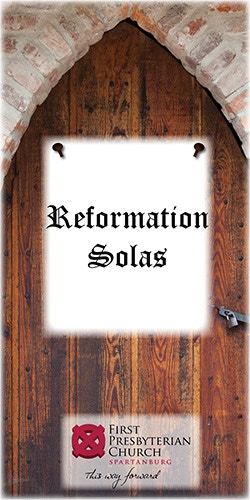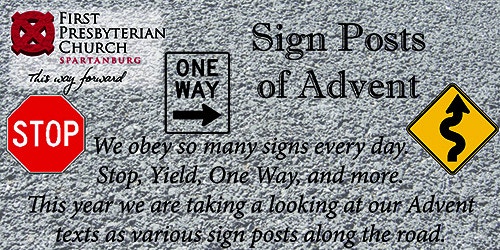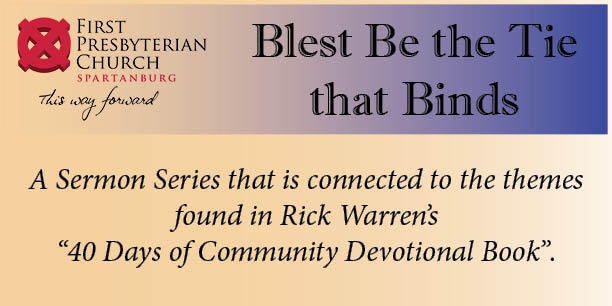
Christmas Gifts
Have you begun the mad rush yet? Did you wait in line to get just the right toy? Have you scoured dozens of catalogues trying to find a present for that impossible relative? Has your gift list grown to unmanageable proportions? Are you tempted to put only one item on your wish list?
Dear Santa, All I want for Christmas is for it to be over!
If so, then I invite you to First Presbyterian church this December to discover a different way to think of the task of Christmas shopping.
In our times a gift is a trinket or bauble we purchase for someone else. But gifts, true gifts are not purchased at the store. In Romans Paul explains that, “Every good gift and every perfect gift is from above, coming down from the Father of lights …” (Romans 11:29) Biblically, gifts are a blessing from God, not Home Depot or Walmart.
They are not toys to entertain or candles to decorate. They are not simply for delight or pleasure but rather objects endowed with profound meaning like that of the Wisemen. These gifts offer blessings to another that encourages them to be who God made them to be or offers them grace when life weighs them down.
As we all know the true purpose of this time of year is to prepare us to receive the most beautiful and sublime gift of all. The Apostle Paul in a moment of ecstatic joy writes,
“Thanks be to God for his indescribable gift!”
This Advent we will explore God’s gifts of the Divine Mailbox and the Divine Alarm Clock, that lead to the most indescribable glorious gift of the Divine Child.
One last thing,
This year in the midst of your Holiday shopping be sure to give at least one Christmas gift. A gift that will bless another and let them know of the love of God in Christ Jesus our Lord.
Have a Blessed Advent!
Tom

Wisdom for Life: Proverbs
You may have come across these modern updates of familiar sayings:
Close but no Wi-Fi,
Never judge an app by its icon,
and the tweet is mightier than the sword
Clever sayings however are nothing new and the ancient world had their share like:
Liars when they speak the truth are not believed, from Aristotle and
He who will not economize will have to agonize, from Confucius.
The Bible also has its share of sayings and some of them are curious like Ecclesiastes 9
Better a living dog than a dead lion
and others outright surprising like Proverbs 31
Let beer be for those who are perishing, wine for those who are in anguish!
But the ancient world went one better than our modern one. Whereas we have self-help books that offer something more than a sentence or two of advice they had Wisdom literature. Unlike our modern works, manufactured by the publishing industry to do more help to the author’s and publisher’s bottom line, these wisdom works generally had no official author and were collections gathered over the course of centuries that offered true lasting insight into the human condition.
The Bible has several books within the Wisdom literature tradition of the ancient world, Job, Proverbs and Ecclesiastes and for the month of November we are going to explore the insights of Proverbs’ wisdom for life. Specifically, its call to cultivate
a cheerful heart,
a listening ear,
and a committed will.
I invite you to read through the whole book so that, together, all of us can “make our ways straight through the way of wisdom.” Peace,
Tom Evans

500 Years of Reformation
500 years ago, the reformation created titanic shifts in our faith, culture and world. Its impact on us today is still very strong and, as we continue to struggle with community, dignity, and justice for all people, key learnings from that time are more critical now than ever.
Much of the heart of the reformation is captured through a collection of sayings known as “Sola’s” – Latin for “only”.
A sinner is justified by grace alone (sola gratia) through faith alone (sola fide) for the sake of Christ alone (solus Christus), a truth revealed to us in Scripture alone (sola Scriptura)
To God’s glory alone (soli deo Gloria)
The scripture and theology behind these Sola’s completely transformed the church, social structures, and governments.
For the month of October, in honor of the 500th anniversary of the Reformation, we will be exploring the scriptural basis for these sola’s, their role in the Reformation, and their critical importance for the work of the church today.
Come join us that we might work together Soli Deo Gloria! (and learn a little Latin along the way!)

Be Like Christ
For the month of September, we will explore how, through imitating Christ, we can live a richer, more centered, and faithful life filled with purpose and meaning.
One of the greatest devotional works in the history of Christendom, “The Imitation of Christ”, written by Thomas a Kempis (c. 1418) challenges us to live out Paul’s admonition in 1 Corinthians 11:1. He paints a beautiful, if challenging, portrait of a heart filled with love, obedience, and simplicity.
Thomas largely focuses on an interior spiritual pattern, but Jesus was fully human and so we should imitate Christ with the fullness of ourselves. We will explore how to do so in successive weeks in
mind,
body,
spirit,
so that we experience a fully new life.
Come to worship this September and we can learn together how through humility, service, and love we can grow closer to our Lord.

The (Not So) Heroes of the Old Testament
Right now the movie industry is exploding with movies about super-heroes. It is a multi-billion-dollar industry, filled with exciting characters endowed with special powers who inevitably save the day at the last minute through fantastic feats of strength and courage. Many of these movies are delightful distractions, but I think they also play upon our secret hope for a “savior” to rescue this world from its current state of disarray.
But God does not use super-heroes. In fact, for most of the Bible, God uses not-so-heroic people to move forward the plan of salvation.
Last Lent, we talked about ordinary saints; people just like us – of limited capabilities, without world-changing gifts, who nevertheless make a profound difference through their love, compassion, witness, and simple kindness.
However, there is another Biblical character, as well as another side of ourselves; the ordinary saint is us at our best, helping others out of concern; but the Bible also shows that people of great, even profound, weakness, sin, and fear still have a crucial and primary role to play in the plan of salvation. These are people that God uses in spite of, or perhaps even because of, their faults. People like Jonah – who wanted no part in God’s plan to save those Ninevites because he wanted to keep God’s forgiveness for his own people – or Samson – a petulant bully who used his strength for his own entertainment.
Through these stories, we will discover it is not so much their faith in God, but rather God’s faith in them, that moves the plan of salvation forward.

Ordinary Saints
This Lent we are going to explore those characters in the Bible who don't take up more than a sentence or two, perhaps we don't even learn their name but, nevertheless, they made it into scripture. They are in and out in a verse but, when it was their time, they did the Lord’s will. Their acts were not extraordinary. In fact, they simply did the ordinary things you or I might do on any given day.
Through this series I hope that each of us might gain a better understanding of what it means to be a saint in the kingdom of God. It does not mean we are especially holy people. It does not mean we have extraordinary virtue or stamina. It means we have a holy God and, though maybe a simple one, we have a holy calling – to be of service to our God whenever we can, in whatever manner we are asked.
We shall discover it happens in the ordinary moments of life – by carrying someone’s burden a little way down the road, using your money to further a cause, helping a sick friend to get the care they need.
These are the simple acts of human kindness that have become a part of God’s Holy Word and that I suspect most of you do every day of your life and, when you do them in God’s name, you are a saint.

Sign Posts of Advent
Dr. Tom EvansWe obey so many signs every day. Stop, Yield, One Way, and more. This year we are taking a looking at our Advent texts as various sign posts along the road.

Blest Be the Tie That Binds
Dr. Tom EvansA Sermon Series that is connected to the themes found in Rick Warren's "40 Days of Community Devotional Book".

ACTing as the Church
Dr. Tom EvansA sermon series to inspire every aspect of church life, strengthen the bonds of the congregation as a family, and ignite passion for service.

Jesus's Family Tree
Dr. Tom EvansDid you grow up hearing stories about your ancestors? Did you sometimes worry or dare to hope that they influenced and shaped who you are? Did you always wonder why those boring genealogies are in Matthew and Luke's Gospels? Our family trees can both make us exceedingly proud and terribly ashamed, sometimes on the same branch. Jesus' tree is no different. Grow in love and understanding of our Lord through exploring his family tree in our 2012 Advent series.

